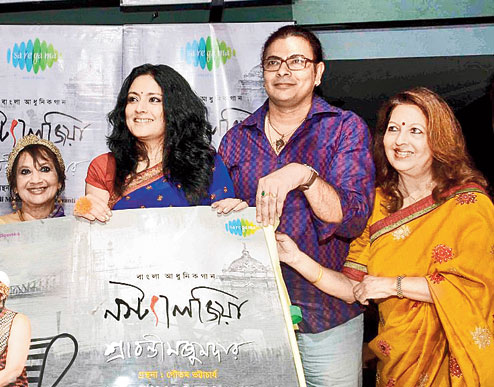 |
| (From left) Sravanti Mazumdar, Agnimitra Paul, Surojit of Bhoomi and Rita Bhimani at the launch of Nostalgia |
Mathar ghono chul jokhon morubhumi hoye jay.... If you have grown up in the late 70s or early 80s, you would not take the words as a bald man’s plaint but start humming. For, these are the lyrics of a popular radio jingle for a haircare product of the time.
The voice of many such unforgettable jingles (Surobhito antiseptic cream Boroline is another) that vanished from the airwaves in the mid-90s is back, riding on a wave of nostalgia.
Nostalgia is the name of Sravanti Mazumdar’s comeback album, featuring a mix of new and old songs. “My return to radio happened in 2010. Now that I am back with an album, I want to do more,” she said.
“My father wanted me to be Hirabai Barodekar. I became a pop singer instead,” Sravanti said on the sidelines of her album launch. Her deep, sensuous voice that made even “daad, haja, chulkani (ringword, scabies, itches)” sound sexy was a cause of low self-esteem in her school days. “Girls asked my name just to listen to my hnere gola (deep bass ),” she recalls.
Sravanti’s entry into the world of jingles was an accident. She turned up at the race course residential recording studio of Colonel R. Bose, the clerk of the course at Royal Calcutta Turf Club. “Listening to me sing a couple of songs, he asked if I would sing jingles. Without knowing what that was, I agreed. My first assignment was a duet for Kolay Biscuit, with Pintu Bhattacharya.”
Col. Bose soon set up a full-fledged studio on Harrington Street. This is where Sravanti would record her jingles and her radio programmes — Boroliner Sansar, Moner Moto Gaan Mone Rakha Katha, Amor Kahini Arabya Rajani, Bata Golponatya, Keo Karpin Natoker Din. Lunchtime, especially on weekends, was incomplete without these programmes on Vividha Bharati. “Another show I did was called Jabakusum Mushkil Asan, in which I would answer queries on anything under the sun — bus routes to home remedies to matters of the heart.
Such was her popularity that fan mail would come in bagfuls from the Park Street post office. “I remember one written by a girl from London, with just my name, my profession followed by Calcutta, India. It still reached me!”
The queen of jingles also sang modern songs, the most popular of them Ay khuku ay. “When Pulakda (Pulak Bandyopadhyay) wrote the song, I told him only Hemantada had the voice to sing with me. EP records had just come to India and the song’s length was a problem. Composer V. Balsara suggested the last two stanzas be chopped but Hemantada asked him to make do without musical prelude and interludes instead. Even last weekend, when I sang the song at a Bijoya show, there were moist eyes.”
Another memory that endures is of recording Tumi amar ma with Sandhya Mukherjee in 1980. “The recording went on till 11pm. I was nervous but she treated me like a daughter.”











